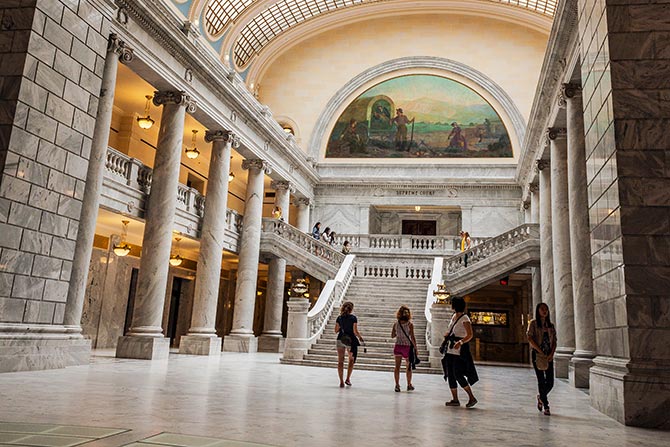Seems like there’s a new one every year. You just can’t make them stop. For the most part, it’s the same story and people, with maybe just a little variation. It usually starts off with a blazing flurry of action, followed by an unbearable stretch of “plot development,” only to be capped off with another thunderous race to the finish line, where we can all rest assured knowing there won’t be another iteration for at least 10 more months … sigh … if only Vin Deisel could help with the 2024 legislative session in Utah.
This year has already stacked up to be as fast-paced as years past. Pulling up to the line with 458 numbered bills, 11 concurrent resolutions, 23 joint resolutions and five resolutions, the House is revving their proverbial engines. The Senate crowd won’t be disappointed, though, with 187 numbered bills, four concurrent resolutions, 15 joint resolutions, and two resolutions under the hood. Below the tree light, a total of 705 documents for consideration. In addition, we expect several unnumbered House and Senate bills to eventually make their way to various committees and then the floors of their respective chambers for debate and votes.
Already, the governor has signed 11 bills into action. While most of them have been budget-related, three early starters include SB57 (Utah Constitutional Sovereignty Act), HB257 (Sex‑based Designations for Privacy, Anti-bullying and Women’s Opportunities) AND HB261 (Equal Opportunity Initiatives). The two House bills signed into law affect the architectural community directly but had little time for debate or input, having been drafted in the months preceding the legislative session. However, the Government Affairs Committee (GAC) and AIA Utah offered input on both in the short time that we’ve already been underway.
This year, there are several other bills being tracked by the GAC and our AIA lobbyists with input from local design professionals. The following (with brief descriptions) are bills that are directly relevant to the built and natural environment with the potential to impact our industry and the services we provide to clients ranging from private residents to public agencies:
House Bills
HB011 — Water Efficient Landscaping Requirements: Restricts lawn or turf by certain government entities.
HB047 — Utah Seismic Safety Commission Amendments: Extends sunset to 2030, effective date changes.
HB048 — Utah Energy Act Amendments: Office of Energy Development changes.
HB058 — International Licensing Amendments: Broadens satisfaction of education/experience for licensure.
HB064 — State Construction and Fire Codes Amendments: Modifies state construction and fire codes.
HB104 — Property Owner Association Amendments: Prohibits HOA from prohibiting Radon-related modifications.
HB152 — Residential Construction Amendments: Requires DPL to create model residential construction contracts.
HB188 — Building Permit Requirements: No agency changes can be required after a permit is issued.
HB195 — Land Use Planning Amendments: Consider wildlife in adopting general plans and land use regulations.
HB215 — Home Solar Energy Amendments: Allows customers to rescind contracts within a certain time of installation.
HB235 — Eminent Domain Amendments: Bonneville Shoreline Trail is public use, allowing for eminent domain use.
HB237 — Land Use Authority Amendments: Prohibits agency aesthetic requirements unless already codified.
HB275 — Water Amendments: HOA can’t require keeping lawn or turf.
HB280 — Water Related Changes: Water resources board to impose fees and prioritize requirements for those fees.
HB289 — State Property Ombudsman Amendments: Allows for legal fees if prevailing with an ombudsman decision.
HB343 — Design Professional Services Procurement Amendments: Definition to include landscape architects.
HB374 — State Energy Policy Amendments: Encourages market-based solutions to current energy issues.
Senate Bills
SB118 — Water Efficiency Amendments: Developer incentives for water-efficient landscaping in new developments.
SB144 — Public Art Funding Amendments: Creates public art installation initiative with possible funding match.
SB168 — Housing Affordability Amendments: Statewide building code for modular building units.
Congressional Bills
AIA has been advocating for you directly and is excited to see HR 7024 (Tax Relief for American Families and Workers Act of 2024) making its way through the capital building in Washington, D.C. Part of this bill addresses provisions of Research and Development deductions that switched to an amortized model under a prior sunset provision. Due to the intense impact on design firms across the nation, AIA members on both local and national levels have reached out to their representatives to encourage support for this and other similar bills. On Jan. 31, the House voted in favor of this new bill with significant bipartisanship and a 357-70 count. Thank you, everyone, for your collective efforts, but it still has to pass the Senate, so keep up the pressure and help your interests be represented across the country.
If you don’t see a bill that you’ve been tracking, let us know or join us for our GAC meetings each Wednesday at 8:00 a.m. during the session. We’re certainly open to more input from all our professionals as the session continues.
Over the next several weeks, we look forward to working with you all alongside our representatives to share our voice as design professionals as we head for the checkered flag. With any luck, we’ll straighten a few curves and flatten a few hills … wait, that’s a different car show … any good lines from “Herbie Goes Bananas?”






